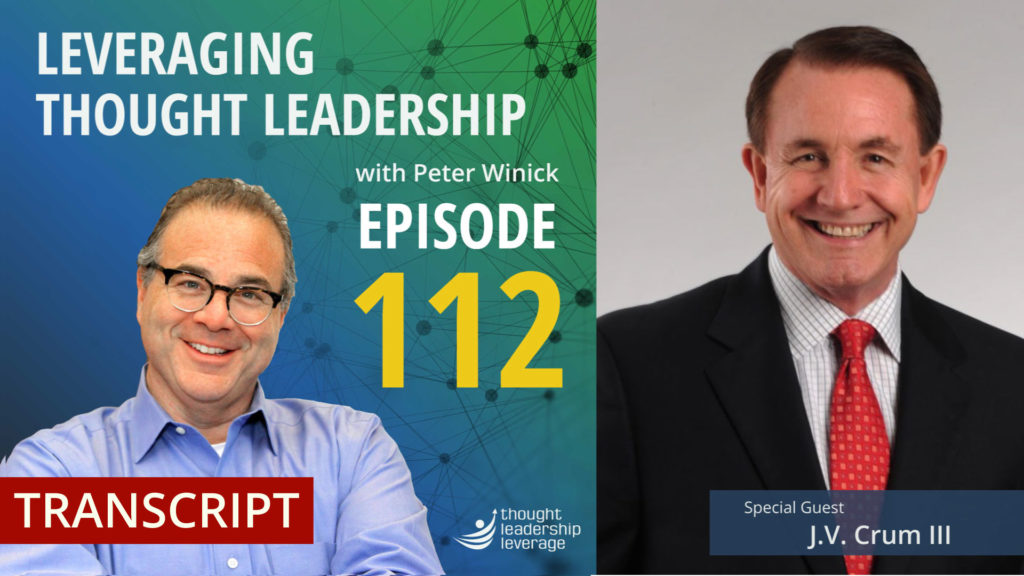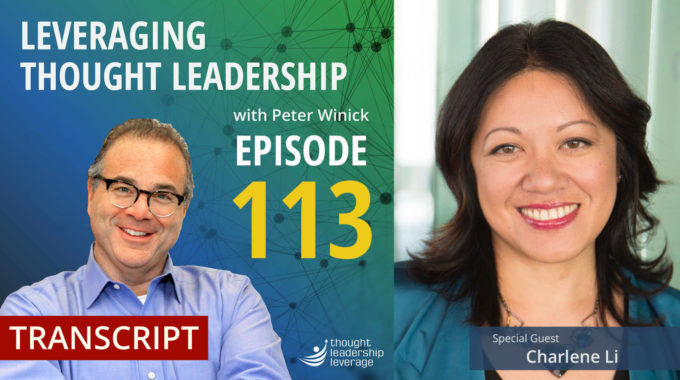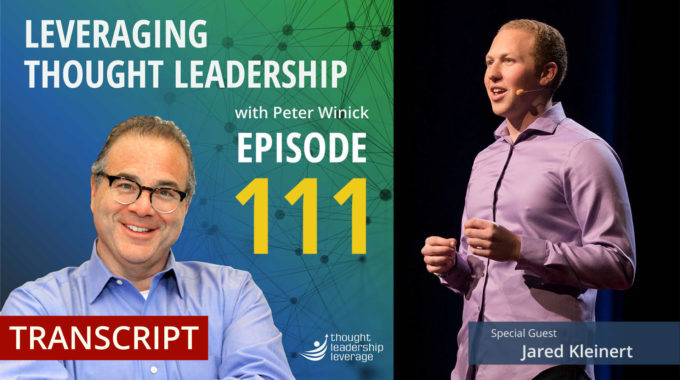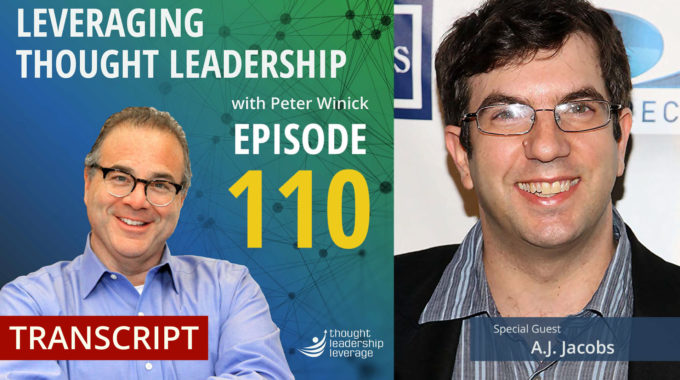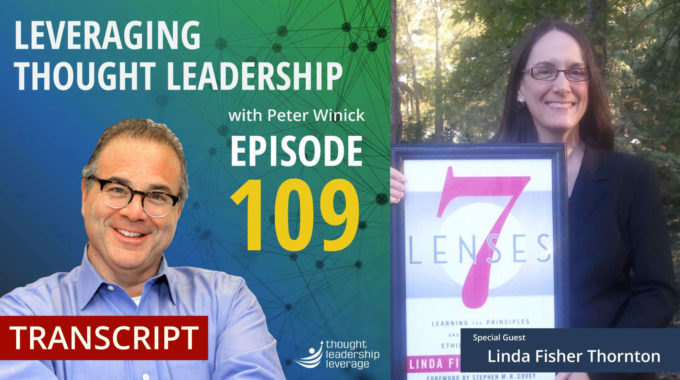Helping Your Thought Leadership Marketing Find Range, Reach, and Results. An interview with Charlene…
Thought Leadership and Content Marketing Strategy | J.V. Crum III
Channeling Your Energy to Create Your Best Content Marketing Strategy
An interview with J.V. Crum III about content marketing strategy, supercharging your business, and how to get rapid acceleration toward success.
We interviewed J.V. Crum III, the Founder of Conscious Millionaire. He became a self-made entrepreneur millionaire in his twenties, and now he’s a best-selling author, keynote speaker, certified business coach, licensed attorney, and serial entrepreneur, here to teach us more about great content marketing strategy!
Three Key Takeaways from the Interview:
- Helping your clients identify what is going to change their business the most in 30 days, and how to get rapid acceleration.
- Why great podcasts are designed to give information that will help them move the needle forward and build their business.
- How to channel your fast-moving energy in order to get it out of your system, so you can slow down and write your best content.
Transcript:
Peter And welcome, welcome, welcome. This is Peter Winick, I’m the founder and CEO of Thought Leadership Leverage, and you’re joining us on our podcast today, which is Leveraging Thought Leadership. Today, my guest is J.V Crum the third. J.V. who is a very interesting guy who’s been named by Inc magazine as one of the top 13 business shows. He hosts the Contest Millionaire Podcast and Radio Network. They’ve got over 18 hundred episodes in their herd in eighty countries. He’s the number one bestselling author. A serial entrepreneur made his first loan at twenty-five. He’s a high performing coach and who is the owner of an accelerator or mastermind group or contract million or so. Welcome aboard, J.V.. Thanks for joining us today.
J.V. Crum III Well, hi, Peter. And listen, a huge hello. If you’re listening today, I know you’re in the right place and I’m just excited to be able to connect with you and Peter. Thank you so much for having me on the show.
Peter My pleasure. So, you’ve got Conscious Millionaire, which is really awesome in terms of what it represents as a body of content. And you’re really clear about who your targets are and what you’re how you’re helping them. Talk to us a little bit today around the various sort of flavors that kind of millionaire comes in from the books to the writing to the podcast, how it connects all together.
J.V. Crum III Absolutely. Absolutely. So, there’s the book Conscious Millionaire Grow Your Business by Making a Difference. And interestingly, it launched in the same three-month time period as I launched our original podcast, which was back in the fall of 2014. When it watched, it literally became the number one book on all of Amazon. It was number one in 34 categories. We had fifty thousand downloads in just a little over three days. At the same time, I was launching our podcast, which we now have seven podcasts and a radio network over eighteen hundred episodes. Then I do private coaching. I run group coaching. Actually, tomorrow I’m starting another group program. It’s a training six figure business accelerator to help people with five and six figure businesses double their business in the next 12 months and move towards their first million. And then we do the accelerator mastermind. That’s to help again, six figure entrepreneurs, business owners, business coaches who want to accelerate specifically in the next 30 days. Let’s get you identifying what is going to change your business the most in 30 days and get a rapid acceleration. So, and then I speak to keynotes next week. I’m doing an event wherever a breakout session actually on podcasting. So, you know, that pretty much runs the gamut of what we do in that we have, you know, a lot of free, free giveaways. We’re going to give one way today on how to be a high performer. So that’s really all the different ways that we use things. But then we have a blog. We put articles out on LinkedIn, you know, every day we’re putting images in quotes for me. Our podcast out on Facebook, on LinkedIn, we do videos on YouTube about Conscious Millionaire. So, you know, Instagram, we’re very active on that, pretty much covers what we’re doing in terms of content.
Peter So walk us through sort of the continuum of content, broadly speaking, or whatever format is on one end of the continuum. It starts off with the purpose of building awareness. Right. You’re putting a lot of stuff out there and a lot of different formats so that you can connect with the right people, get them to ultimately be engaged and realize there’s so much more that you have to offer them in various formats. And then ultimately for a subset of the audience that becomes aware and becomes engaged. They become clients of yours in one way, shape or another. So, what is that sort of content journey? Looks like you map that to an individual’s journey of where I might trip over you.
J.V. Crum III Yeah, it’s a great, great question, Peter. I’d actually like to start with the three whys that I begin every client with and how we look at our podcasts and everything that we’re doing. A Conscious Millionaire. And the first why is what’s the impact that we want to be making? And the impact actually can be more simply understood is where we are engaging someone when we do our magic process. And then they come to a place we call heaven conscious millionaire. That’s where they want to go. And then the second why is well, is the money is like, what’s the money I want to make and why do I want to make that money? So that informs everything, because it’s a business. You should always be asking; how does this lead to a transaction? Because ultimately, that’s why you’re in business, is to do transactions and change people’s lives. And then the third part, which so many entrepreneurs leave out is, well, why am I doing this for me
Peter As an entrepreneur from a purpose perspective? Is that where that’s from.
J.V. Crum III Well, the purpose really informs that part. It’s like for me, my purpose is very clear. It’s on the home page. It’s to uplift humanity and support the evolution of human consciousness. So, I ask myself on everything we’re doing. Am I doing that? Am I expressing that in some way? In terms of the why. As an entrepreneur that divides into two parts, one professionally and the other is personal. So professionally, I am a guy who wants to play bigger, a lot bigger. And so, I want to constantly raise the awareness of who I am and raise my status so that I can connect with other big players and we can find out ways to play together. So that’s one of the things that I want personally as an entrepreneur. And then on the personal side is, you know, I want time to be able to enjoy my life, to be able to travel, to go to different conferences. And so personally, I want the fulfillment that comes from waking somebody up to what’s possible for them and taking them on a journey of achieving that. That to me is the biggest joy, actually, that I can have on the planet. So, all of that informs all of our decision making. And that’s different than just we want to get content out there and we want to have a content map. We want to get content out there because we want the content to be impacting people in a specific way that it’s helping them move forward specifically to getting to their first million, because that’s our passionate content.
Peter But your content has to push back if we disagree. Ultimately have two functions. One, it’s got to have impact. So that’s on the consumer side, right? Why would I invest my time and energy in reading your work and listening to your podcast, all this sort of stuff? I’m doing it for the children. And to ultimately internalize those concepts that you’ve got and have some input, but for you, in order for it to serve both sides of the coin. Ultimately, you know, a percentage of the folks that get exposed to your content become client. Right. And that’s what sort of feeds the engine. And what I like about you’ve done is it’s not a one-sided equation of yours. It’s good for the world and it’s good for you. Which is good.
J.V. Crum III Yeah, it’s inter-, it’s interesting actually we look at it from a triple win, it’s good for our clients, it’s good for the world, it’s good for us and it’s good for the world because we’re transforming clients who are going out there and themselves making a positive impact as to how they make money. They’re not just how do you sell a widget; it’s how do I do something that really matters to my client. Their life is better. Their business is better. They’re in a they’re in a different place. That’s better for them. So, you’re right. So, we do that through every show that I’m on. I give away something for free. For example, that we’re going to do. And we traditionally call that a magnet. And then you get a name and an email and people get to know more about you and hear about your podcasts and what we’re doing. And then some of those people sign up for and apply for a call with me or they want to know about a course. The same thing is in social media is I go in and personally and am active on Facebook and linked in at least a couple of times a day. If somebody leaves a comment, I leave a comment back to them. I ask a question. I engage, attempt to get to know them and then that can lead. Well, hey, let’s have a call and talk about it.
Peter So given that you are in many modalities, right, from podcasting to books, the masterminds, Instagram, et cetera, what are the core sort of rules? But what are the things that you look for? Because I would imagine there might have been modalities that you tried that just didn’t work you or whatever. So how do you start something? How do you experiment? And then how do you decide whether to continue to nurture it or not?
J.V. Crum III Yeah, I think I think it’s a fabulous, fabulous question, because you’re listening today. And I can guarantee you that there are certain modalities you love and there’s certain modalities you don’t. Right. Right. All right. So, in my case, I wrote what I what I really think is a fabulous book. I’m very happy with it. However, in the process, I found that the process of writing something like a book. And then I found writing even articles and blogs were not exciting for me in the same way as, say, writing an email or writing sales copy button. Certainly it. What’s really interesting is that my book that I’d worked on for a long time, I’m talking years and my podcast came out basically at the same time. And I obviously don’t have eighteen hundred books, but I do have eighteen hundred episodes. So, I think we can conclude pretty quickly that I kind of like the microphone within three weeks. I knew I was in love with this medium, and now I’m beginning to make the videos and I’m saying I want a TV show. I think I’d be good in that medium as well. So, I like the spoken media.
Peter Hold one second there. So, number one is you love it. You’re good at it. You enjoy it. So that’s awesome. But there’s got to be that intersection of and the people that you’re trying to reach are also there. Right. Because I have clients, for example, that are academics that love writing for academic journals. If you’ve ever done that, that’s funding five months of your life to publish something in a very, very high standard. It is read by very, very, very few. Right.
J.V. Crum III So right now, I write books, actually did that in law school.
Peter So I know you’ve been lucky. How do you know that? It’s not just something you but you’re seeing results in terms of, you know, growing your audience or followership, customers, etc.?
J.V. Crum III Well, I’m going to make an assumption here which we can agree on or not agree on. Right. And that is that there are going to be people who are interested in what we have to offer. Interested in making their first million to make it really simple. And they want to make a positive impact and they’re going to be in every modality. So, what’s important, I think, is for each of us to do the modalities that we’re really great at that we’re passionate about. I mean, when I get up, you know, like two days from now, I’m doing two thirds of the day or podcasts. I think I have five podcasts that day. Well, that’s an exciting day for me because I love it. But if I had to get up and write five articles that day, not because I can’t, but because it doesn’t it doesn’t hit my passion point. I wouldn’t be that excited to get out.
Peter Let’s extrapolate. That figure lives a lot. Let me let me to throw some other examples. There are people that love keynote speaker. There are many people who that puts the fear of God. Think the concept of getting up, even if it’s for a good chunk of money. But speaking in front of 500 people, they’d rather have, you know, a simultaneous call and ask to be in it.
J.V. Crum III Right. And I would love doing that because it’s spoken to get right. So, this is a perfect example. And some people would be horrible.
Peter Right. And then there are others where you’re a more verbal guy. So, I’m like in front of you get the right person there. Put some thought into it. Interesting things going to happen. Would you say that, you know, in all the podcasts and stuff that you’re doing, using the spoken word as the primary paintbrush, if you will, you’re also creating things that can be repurposed elsewhere. So, talk about how you determine what the nuggets are and go about repurposing a cool little quote that comes from a podcast. Yep.
J.V. Crum III That’s a very, very good question. Well, on all of our interview podcasts, we have a section on it that has questions and those questions are preset. It’s the it’s the last part of the show. And out of those questions can come nuggets. They’re designed specifically to give the kind of information that our listeners want that will help them move the needle forward, build their business, move towards their first million. And out of those come lots of nuggets that can be utilized in many different ways. And some of those get cycled into like our Instagram and Facebook and our leading quotes where we do quotes from other people. Got it. So, you know, that’s a that’s a perfect example.
Peter Can you give us of an example of a format or modality that you experimented with and decided to pull the plug on it? You know, either I’m not getting the results or I just I hate this. And we talk about writing a little bit, but any other specific modalities that you just sort of said, yeah, enough for me.
J.V. Crum III Yeah, it’s interesting. This year it’s new for me doing videos and I am noticeably to on my team behind on the videos that I’m supposed to be making. And I’m kind of exploring what’s going on with that. I think it’s more just sitting down and doing it. But there’s a part of me that is realizing that I’m probably best and I don’t have the setup right now. I actually have something that I can use as a teleprompter, but it just doesn’t fit where I’m at right now of the room. So, I think that on the videos, I have a little bit of hindrance about not having a teleprompter at the moment. And if you even had a teleprompter, that would work better for me because I seem to be able to read copy really well as if it’s known completely extraneous. So, there’s an exam for not having the right. Oh yeah, I did that. Right now, I don’t have the setup where I have the right tools. And so, I have to basically kind of memorize because we’re doing 1-minute video actually. Fifty-five second videos. And so basically have to memorize that. And I think that’s given me a little bit more hindrance on it. But I don’t think it’s that. I don’t like the video. It’s just getting used to a different medium, basically.
Peter Well, I think that getting used to piece is really the key because, you know, a lot of the folks that I work with, a really good writers. Right. They can crank out, you know, one hundred blogs a month or articles or articles and HBR are etc. They write books. They’re prolific. And then you move them into something else. And that’s something else. Might even be the same written word. But let’s start taking things and putting them out in short form blogs, 350, 400 words. And there’s a struggle because, you know, as we become deep experts in what we do, we are not comfortable with that sort of novice mindset. Right. If would take some of that’s been really good writing books or whatever it is for 20 years and say, OK, now let’s try this new thing. It’s called a 400 word blog. They don’t like the feeling. Like it’s uncomfortable. They don’t have the fluency. And it’s I’m learning a new language. Would you how would you react to that?
J.V. Crum III Yeah, I think I think that’s absolutely true. I mean, we can kind of go back to podcasting, which I love. But when I first started, I had to figure it out. But I was curious to figure it out. And I think that that curiosity is a really big clue. I mean, one of the chapters in my book is actually my favorite topic on the planet. And that’s how to be in the flow. So, you know, it’s a very big part of how I live, how I run business, how I conduct relations. Sure. And I think curiosity gets you into that present moment and get you moved. Forward. I mean, it’s one of the reasons I like interviewing because I’m curious, but I think if you’re not curious about something, naturally, it’s going to be difficult. So, the question is, can you open yourself up, which I believe you can’t too curiosity about how could I learn to love writing 400 words rather than 100? Well, so let me ask you the other side of that.
Peter So if you find that. You’re trying something new. And not the first time because first time or couple of times, it could be a little funky, whatever. And you’re just not all that curious about it. Is that a sign that you’re just not interested? Maybe it’s not for you. This isn’t gonna work. At what point does that work itself through or not?
J.V. Crum III Yeah. That’s a really great question because there are a lot of ways to approach that when I feel that I am forcing myself to do something. Then I have to ask myself what is missing? It doesn’t necessarily mean what’s missing is I. This isn’t something that I ultimately should be doing or that’s right for me or their fifth for sure. It might be that it’s new and I don’t feel confident. A lot of times I find in coaching clients that what’s really going on is they don’t have the steps. They don’t have a process. They don’t have a structure. It’s kind of like today other than being on two shows, I’m doing a lot of sales costs. But I have 100 percent structure now as to how I’m doing those. So, I not only feel confident, I feel excited because I like talking to people. So, but there was a time that I hated doing that. I’d come up with everything in the world not to sit down and have to spend a day doing sales calls, touch on that structure, because it’s a really amazing point, because lots of people have a lot of structure in the areas of their life that they either needed it or that they’re proficient in. Right. If I’m a consultant, what I will give my clients the structures and processes and tools that I use to do certain tasks.
Peter Right. I’m just sort of winging it. If I’m a speaker, I have structure around what am I doing before an event? What am I doing at the event where my going after some of it is almost processed? Some of it is ritual. So, when you’re going into a new space and you’re objective visual, I want to be good at writing short form blogs as the example you might want to ask yourself based on what you’re saying. Well, what’s the structure? I would need to do that. Do I need to schedule 90 minutes on my calendar as a block of writing? What time in the day should I dedicate to that? No. Knowing my tendency is my first in the morning kind of guy? Or is it mid-afternoon with a cup of tea? Right. So how do you sort of invent or develop the processes to support the objective?
J.V. Crum III This is a fascinating question and happens to be something that I’ve done a lot of thinking about because it’s a whole chapter in my book. I love this area. So, I’m going to just to a side note first, because I think this is so credible, because I brought up flow and a lot of times people interpret flow as kind of, oh, loosey goosey, fluffy stuff. It’s not. It’s not. It’s about being in the zone real. One of the things I want to mention about structure and flow is the difference between a body of water that’s just kind of spread out maybe in a circle called upon to a lake and a body of water that’s flowing like a river is the structure of the banks right without structure. There actually isn’t any flow. And most people don’t think about the fact that the flows process. Yes, but it’s a process that occurs within a structure. And that’s why the flow of energy actually occurs. So.
Peter Right.
J.V. Crum III You can’t have flow with lack of process when exist that it actually both of them are necessary. And I think it’s really important to honor that so that we all know that because and I’m saying that because I am a process oriented person, you know, I’m all about systems, but without structure, there are no rights. So now let’s look at the question you asked. So, I have a system where you can’t have more than three priorities for a date. Test it. It’s really hard to have more than three and do them and then just skip into the bottom line. You’re going to chunk your activities. Here’s one of the secrets I discovered, and I’ve taught. This is so many people and it’s like it’s a big aha. There is fast. Energy and slow energy types of activities. You can divide all activities into one or the other. So fast activities are e-mails, phone calls. Being on podcasts, doing what we’re doing. Slow is writing. Working on a project. Like I typically work on Saturdays. And I work on projects because I have a hard time doing that in the middle of the day on a weekday. Just doesn’t seem to work for me. But I catch the day into slow moving activities and fast moving. Like for example, when I’m doing the podcasting frequently, I do seven shows in a day, so I’ll do four. I’ll have an hour break and then I’ll do another three in that hour break eye. I can look at emails if I want because that’s another fast-moving act here. But I can’t sit and write a blog because that requires me slowing my energy down so I can be reflective. So, start by dividing.
Peter So, you know, you can bang out. You could use that time to knock out. I was a local.
J.V. Crum III I could answer every e-mail I find that night. Right.
Peter Write emails and rapid fire things and think things that don’t require a lot of contemplation or introspection or whatever sort of low, low brain functioning things.
J.V. Crum III For example, after you’ve not got all those emails, I say you’re writing a book. So I’ve written a book. I’m probably going to start another book later this year. And what I found is I had to chunk time periods where like for, say, two hours I was going to write and then sometimes had to be flexible with that, because if you’re on, you’re listening and you write in any capacity, you know, there’s something called writer’s block and we all get it like, you know, you go. Why is that? I can’t think of a single idea to make a sentence. What I found. I lived. Somehow, I’m always living like within a block or two of the athletic club, which always is nice. I’m three blocks now, but I was a block at the time. I’m thinking of when I was writing the book. I’d go over to the athletic club and do an hour of aerobics like treadmill and let all this energy kind of process through my body. I’d come back and I would like to have a million ideas and could just sit and write. So sometimes you have to go do another activity. That’s a fast-moving activity to unblock the energy so you can come back and do the slow moving activity.
Peter Interesting. This has been fabulous as well. As we start to wrap up, I know you had a gift for folks, so let’s tell them where they can get that gift from you.
J.V. Crum III Sure. But I work with people who want to be high performers. And I know if you’re listening today, you want to be a high performing, you want to go to some level, you’re not out right now. You wouldn’t even be listening. So first, I want to congratulate you for taking that step. The high performer formula will give you the steps to becoming a true high performer and going to your next level. And you can get it at conscious millionaire dot com. So that’s conscious millionaire. My brand. Dot com forward slash high performer. So conscious millionaire dot.com Ford slash high performer. So, it’s conscious millionaire dot.com Ford slash high performer. And you can get the high performer formula and download it.
Peter Great. Appreciate your time. I appreciate your sharing everything that you did with us today. Lots of lots to learn from you as you’ve dabbled and succeeded in many modalities. And you’ve got some really amazing content and some great stuff with it. Thank you for sharing all you did with us today. We appreciate it.
J.V. Crum III Well, Peter, it’s really a pleasure to be on with you. Thank you so much for having me as a guest. And I just want to give my best to you. Your listening today. What I always say on a podcast, there’s no accidents. This was information that was right for you. And what I want to challenge you is to take something from today’s show and in the next 24 hours, put it into action stuff. Good advice. Thank you so much.
With so many modalities to pick from, you might also find yourself overwhelmed with ideas. Our COO Bill Sherman talks about why sometimes you need to close the Idea Factory.
[/vc_column_text][/vc_column][/vc_row]